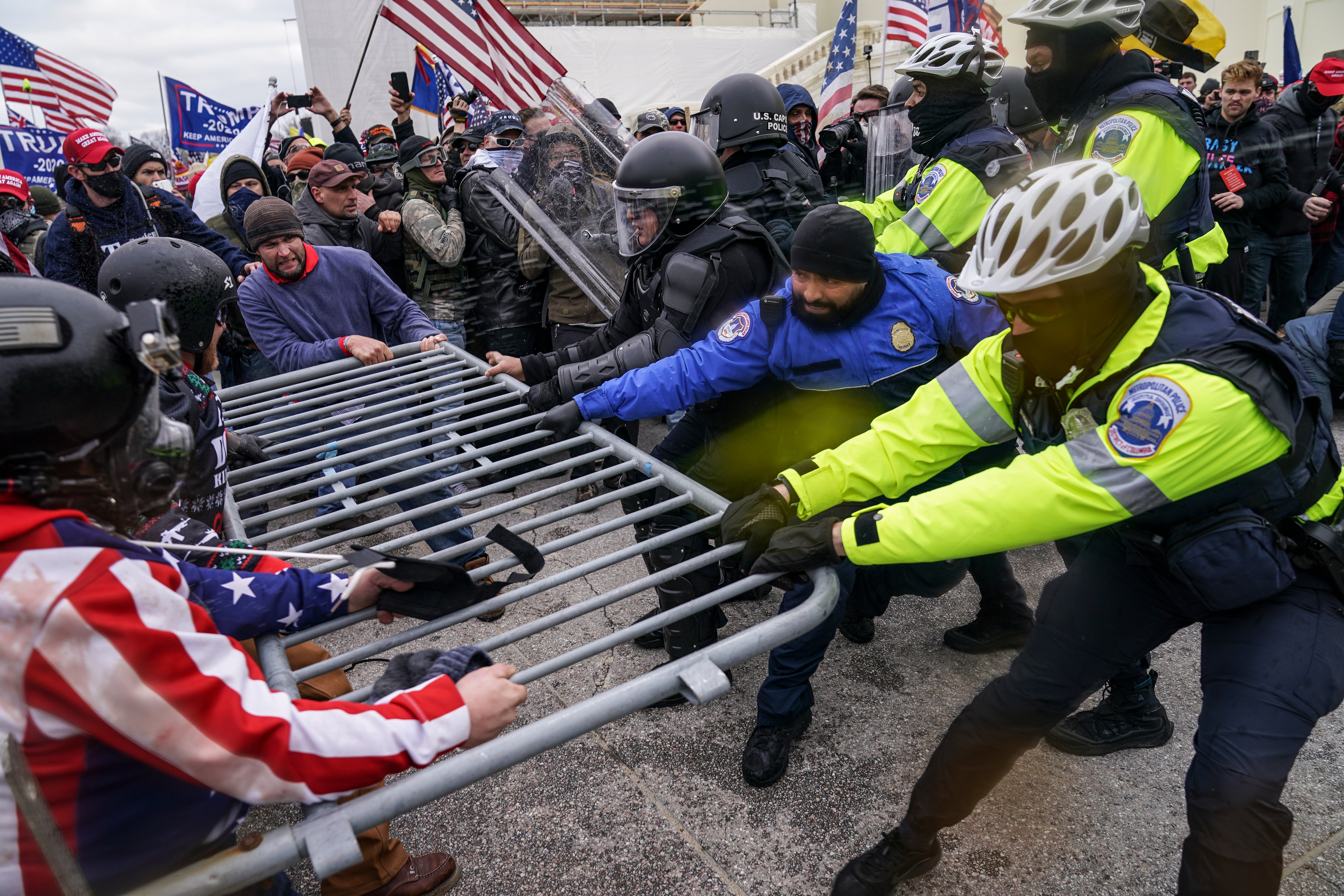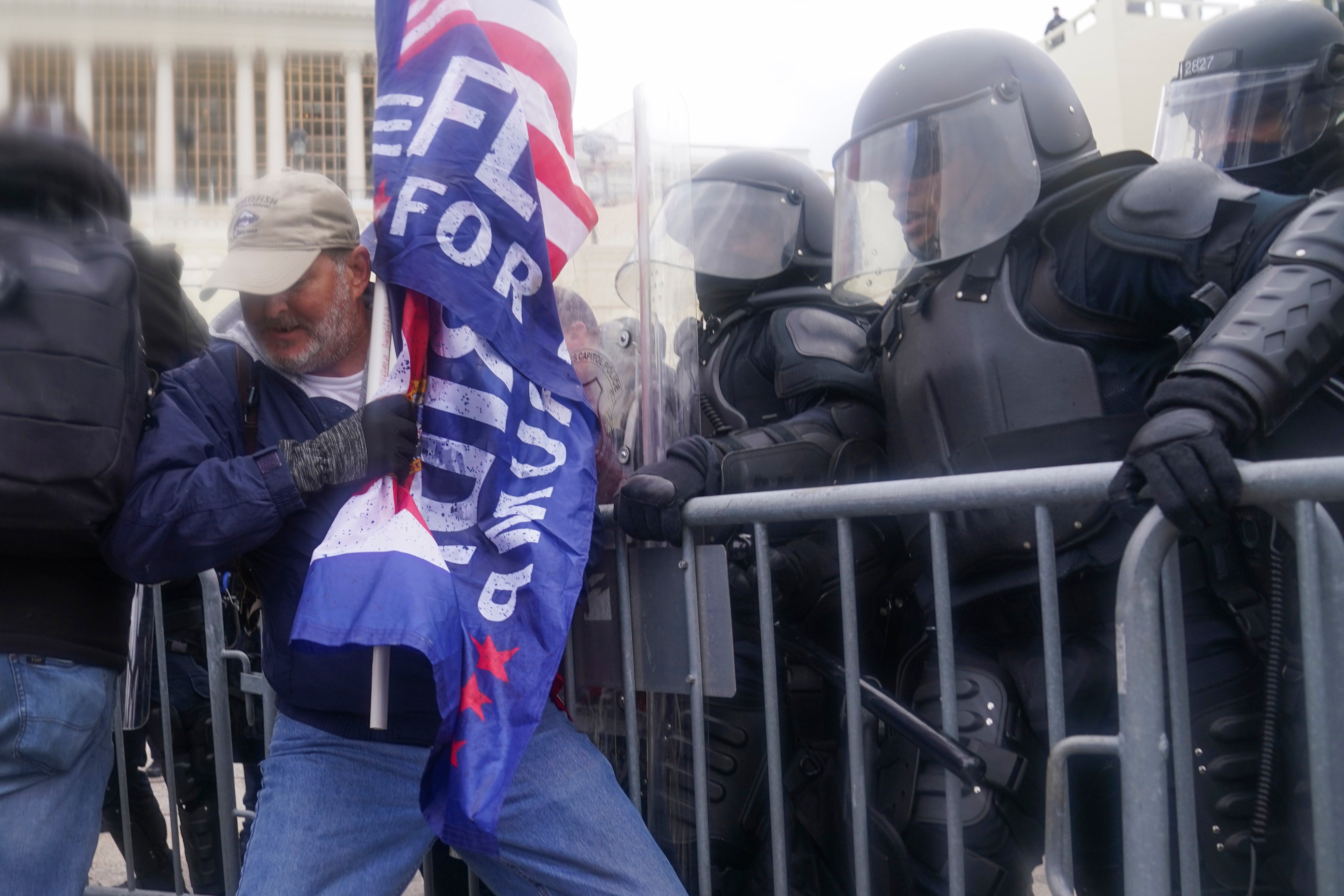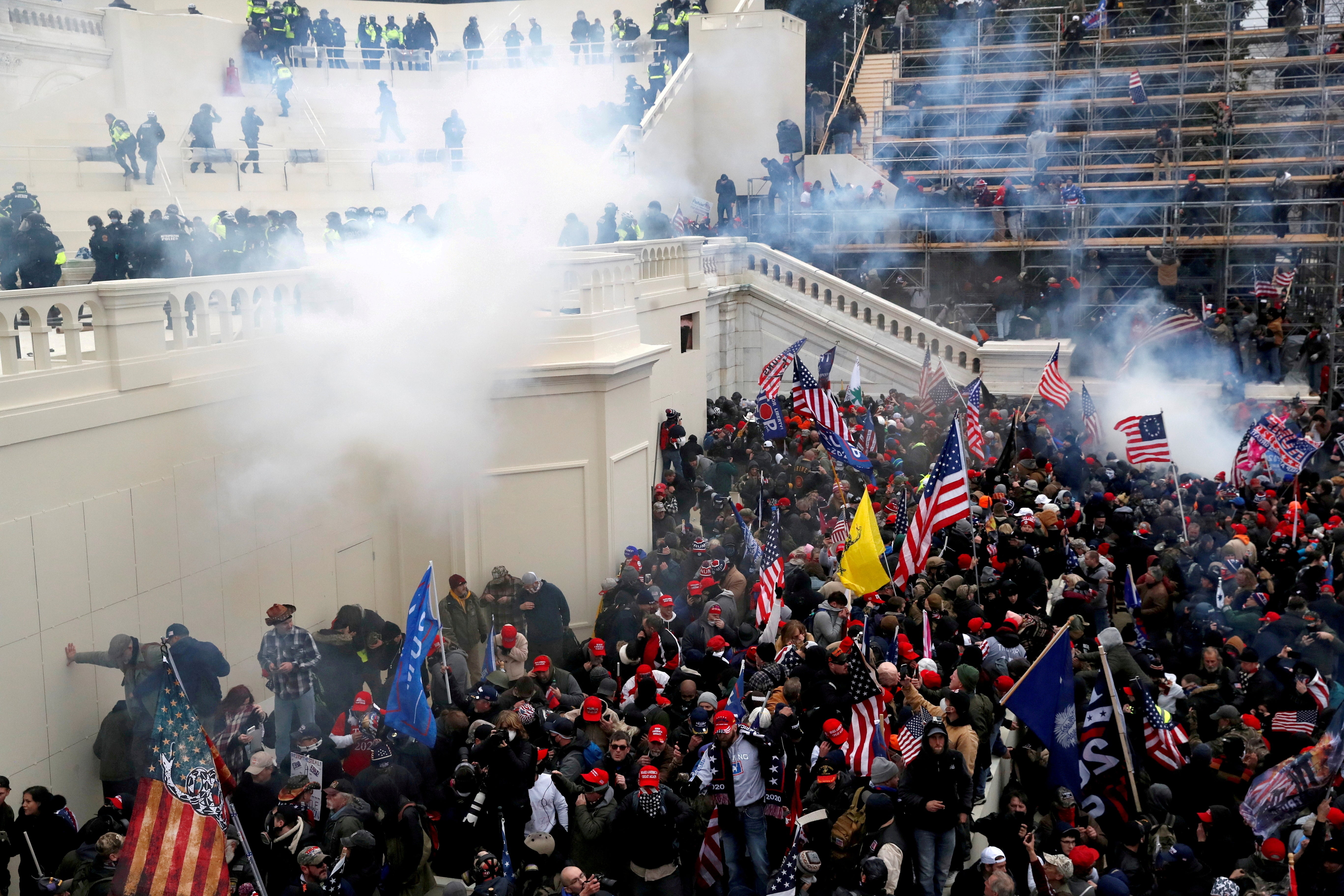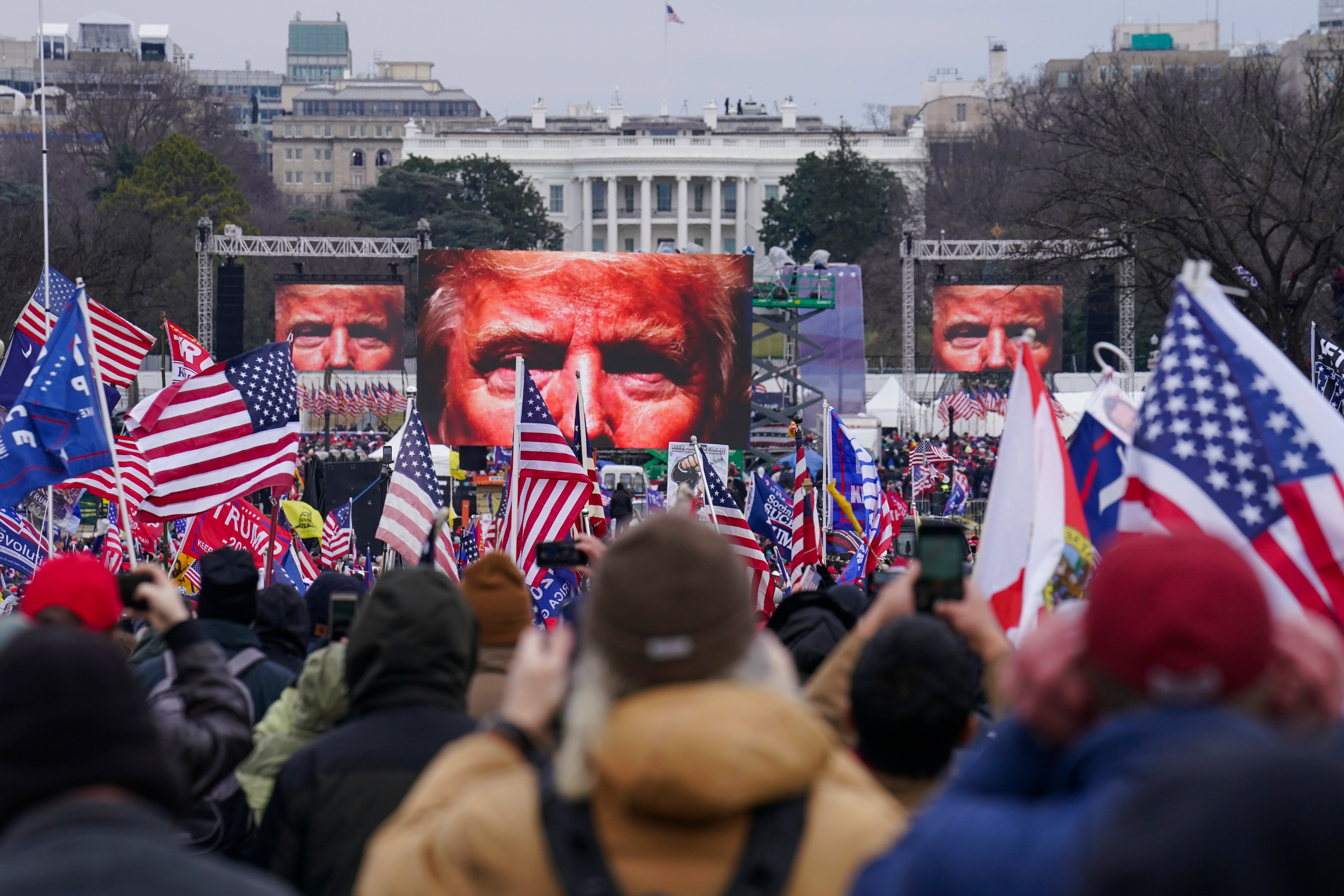‘It’s gonna leave a scar’: Capitol Police and staffers reveal details of Jan 6 - and the trauma that remains
Capitol police and nonpolitical staffers are still struggling to deal with the impact of the attack on their place of work a year ago, writes Andrew Feinberg.


Your support helps us to tell the story
From reproductive rights to climate change to Big Tech, The Independent is on the ground when the story is developing. Whether it's investigating the financials of Elon Musk's pro-Trump PAC or producing our latest documentary, 'The A Word', which shines a light on the American women fighting for reproductive rights, we know how important it is to parse out the facts from the messaging.
At such a critical moment in US history, we need reporters on the ground. Your donation allows us to keep sending journalists to speak to both sides of the story.
The Independent is trusted by Americans across the entire political spectrum. And unlike many other quality news outlets, we choose not to lock Americans out of our reporting and analysis with paywalls. We believe quality journalism should be available to everyone, paid for by those who can afford it.
Your support makes all the difference.When the Covid-19 pandemic forced Congress to shutter the US Capitol to most visitors and send most legislative staff home to work remotely, a core group of essential workers didn’t have that option.
Even without the hustle and bustle attendant to the thousands of tourists, lobbying groups and staff members who make their way through the labyrinthine corridors and grand lobbies of the Capitol on a normal non-pandemic day, there were still entrances to be guarded, food to be served, bills to be filed and debates to be had.
This meant that for the police, service workers, and nonpartisan staff who keep the complex running, the show had to go on. And so when it came time for Congress to meet in its quadrennial joint session to certify the presidential election results, they showed up for work. They were at their posts when a pro-Trump mob hoping to disrupt that session perpetrated what would be the worst attack on the Capitol since 1814.
One year later, roughly half of the members of Congress who these often-anonymous workers protect or serve have written off what ex-vice president Mike Pence — himself a target of the mob — now dismissively calls “one day in January,” and now condemn the House’s investigation of what happened as a political smear job. But many of the people who fought to defend the Capitol that day or laboured late into the night to allow Congress to complete its work that day are still struggling to comprehend what they saw, heard, and felt.
Over the last few weeks, The Independent has spoken with several staffers who lived and worked through the events of 6 January 2021. Their message was unified, loud and clear: They are not ok, and they’re afraid what happened that day could happen again.
One of the Capitol Hill veterans who agreed to speak with The Independent — who used the pseudonym “Winston” because his current employer would prefer he not weigh in on what has become a political controversy — spent three decades in various roles on the House’s nonpolitical staff. But after rioters ransacked his workplace and magnetometers appeared outside the House chamber, he put in his retirement papers and now works in the private sector.
When the mob came to the House side of the Capitol on 6 January, his vantage point on the House floor let him see two things that had been unthinkable up to that moment: Rioters trying to breach the Hall of the House by breaking through the ancient glass on the chamber doors, and Capitol Police officers looking back at them through the sights of their .40 calibre Glock service pistols.
“We started to get a sense that things were devolving outside … and the sergeant at arms announces that there was a breach of security, but they were getting it under control. And so we go back to debating for, I don’t know, a minute, two minutes. And then next thing you know, he’s back and he says, they’re in the rotunda and they’re coming here. And at that point, there are police in the chamber, and they’re running … to secure the cloakrooms. They’re running to the back of the chamber, and they’re taking furniture and piling it up against doors,” he recalled.
Winston, who up to that day had spent thirty years reassuring friends and family that he worked in one of the safest buildings in the US, said he spent the next few hours in a state of shock after having the presence of mind to send a brief text message to his family to reassure them that he was unharmed by the mob rampaging through his workplace.

“I knew that it was very serious, and that things could go — they could turn really quickly, like on a dime. But throughout the whole thing, I was kind of just in survival mode,” he said.
Another three-decade veteran of the House — who used the pseudonym “Dudley” — serves in a nonpolitical role under the auspices of the Clerk of the House. In a phone interview with The Independent, he recalled how he was in his office on 11 September 2001, the day terrorists flew a hijacked airplane into the Pentagon just miles away and the sighting of another plane caused the Capitol to be evacuated.
Just over twenty years later, he spent the entirety of the Capitol attack behind a locked door listening to rioters yelling about how they were coming to kill him once they had dispatched House Speaker Nancy Pelosi. And one year on from that experience, Dudley said he can’t see how anyone who lived through that day could not still be carrying around at least some trauma endured during those harrowing hours.
“No matter who you are, if you work up there, if you’re a staffer up there, you’re affected by it. If you were there, it is gonna leave a scar,” he said, adding later that he still has “triggers” that will throw him into a “mini rage”.
He described how for months, the sound of Capitol Police communications — a common background sound anytime one enters the Capitol — would take him back to the hours spent listening to police officers running through the halls, calling out over their radios for someone — anyone — to back them up as they battled the mob.
But more recently, it has been talk from members of Congress setting him off, specifically a small band of House Republicans who’ve turned Ashli Babbitt into a martyr.
Babbitt, an Air Force veteran whose violent entry into a blocked-off hallway being used to evacuate House members and floor staff forced a Capitol Police officer to shoot her dead, has become a hero to Trump supporters who believe lies circulated in conservative media about the circumstances of her death.
Dudley, who spoke to The Independent over the Christmas holiday, expressed disbelief that Babbitt could be seen as anything other than a violent rioter who disregarded police warnings.
“There’s literally a woman trying to crash through the chamber doors after being told repeatedly to stop. She gets shot and she becomes a martyr to some of the more radicalised members of Congress and their staff. In what world does that even make any remote sense? To see a good amount of membership represented in the House and Senate be complicit in what happened disgusts me,” he said.
“She wasn’t just casually walking down the hallway until a cop just decided to put her down. She was told repeatedly to stop doing what she was doing by a police officer and finally decided that he needed to protect the members of Congress in there from a mob trying to crack into the chamber”.

Winston, now employed in the private sector, still has not found the clarity of mind to make sense of what happened a year ago. And many of his former colleagues who still work in the Capitol are having the same problem.
“We’re all still trying to process and understand what the hell that day was,” he explained.
Winston said that task is even harder for those who are still on the job there because for the most part, staffers haven’t had the chance to process their feelings or talk through what happened with each other because the Covid-era workplace leaves very few chances for socialising.
“There’s so little social interacting between Covid — but also just the volume of work … when you’re working, you’re there to work. And then when you have free time the last thing you want to do is hang out with people from work,” he said. “One of the things I think is unfortunate is that there haven’t been a lot of opportunities for staff people to do the self-care that they badly needed to do as a result. And so that had to bury that and just not deal with it in any way”.
He predicted a further breakdown in many of his former colleagues’ mental health if the 2022 midterm elections put the House under the control of a Republican caucus that has made denying the reality of what happened on January 6 a requirement for membership in good standing.
“I do think that there’s going to be some people who are going to really struggle. Because … I think people have trust issues right now,” he said. “It’s still too painful and too shocking to process. And I think … for a lot of people who are still there, they can’t even articulate that far. They can’t articulate that much, because it’s just too challenging at this point”.
While House staff have struggled to find venues to air their feelings about the day their workplace came under siege, two of the Capitol Police officers who fought back against the mob that day — Officer Harry Dunn and Sergeant Aquilino Gonell — have made a point of speaking openly about their experiences.
Both have become frequent targets of right-wing media since 27 July of last year, the day they joined two DC Metropolitan Police Department officers in giving evidence about what they and their colleagues endured at the hands of the mob during the January 6 select committee’s sole public hearing so far.
Like Winston, Sgt Gonell told The Independent the attempts by GOP members to rewrite the history of that day still strike a nerve.
“In their alternate reality, the police officers were the bad guys who killed that lady [Ashli Babbitt] for no reason, despite everybody breaching the Capitol, breaching layer after layer after layer of security … and then claiming that they were ‘peaceful?’”
“I’m still recovering from those peaceful … protesters’ ‘concert-like event’ or — as some of the members say — ‘tour,’ said Sgt Gonell, who only recently returned to a limited duty status, serving in a desk job on the night shift.

The Army veteran, who emigrated to the US from the Dominican Republic as a child in 1992, said he did not expect any medals or accolades when he went to work on 6 January last year, nor does he expect any now.
But the right-wing attempts to revise history to make it seem as if he and his colleagues should have simply let the pro-Trump rioters have free reign throughout the Capitol shows that some members care more about reelection than they do about the health of the country.
“Many of those people have not raised their hand to defend the country overseas, or here as police officers. They claimed to be fighting for the Constitution as they tried to destroy the very thing that they say that they’re trying to protect,” he said.
He added that in his estimation, more Capitol Police officers have not come forward because they do not want to become a target for the political right in the way he and his colleagues have been since they testified last July.
Officer Dunn, a 14-year veteran of the Capitol Police department, said the drumbeat of new revelations about the events of January 6 has in part made it difficult to fully process what happened.
“It’s like you try to … have the band-aid on it, and then it gets ripped back off…metaphorically speaking …because it makes you think … we don’t even know what questions to ask. We don’t even know what we don’t know,” he said.
Still, Officer Dunn said he has still tried to “just follow the facts”. Unlike his colleague, however, he tries not to give much attention to GOP members who are still trying to downplay the significance of what happened to officers that day — or the fact that some of his fellow USCP officers have been accused of trying to help the pro-Trump insurrectionists.
“I don’t give it much thought upon the things that occupy my thoughts with that…everybody has their day in court, and if the allegations are true they’re extremely disappointing”.
More discouraging to him than the Republican intransigence over that day is the indifference of many of his fellow Americans.
“It’s so hard to even try to put my point across … I get discouraged sometimes, because so many of the people in the population, this country, just want to move on from it,” he said. “Even the Fraternal Order of Police”.
“I cannot believe people can’t see this — I consider myself a smart, educated person and I clearly have political beliefs that I believe, but I also try to stay fact-based. — And so many people just deny facts that are right in front of your face”.
He added that he believes many of his fellow officers — as well as other denizens of the Capitol complex — are “still struggling with what happened that day” and will continue to do so, regardless of whether perpetrators of those events are brought to justice or not.
“People were victims and potential victims that day, whether that’s a member of Congress, whether that’s a staffer, whether that’s somebody who was watching on their TV and felt their democracy was under attack,” he said.
Dudley, the current House staffer, was far less diplomatic about the effect GOP January 6 “truthers” such as Georgia Representative Majorie Taylor Greene have had on his efforts to process what happened.
“You’ll just see a tweet where a member you know supports Ashli Babbitt, and it’s like …f*** you. You know what I mean? Like f*** yourself,” he said.
“So now it’s kind of like mini-outages where it’ll just be a little thing where I hear a member say something stupid … or whatever, kind of defend what these people did. And that’ll make me kind of clench my fist … make my stomach tighten a little bit. I still have the triggers like that.”

Asked whether he fears that not enough has been done to keep another insurrection from taking place, Officer Dunn said he didn’t want to talk about specific remedies that could be applied to how the Capitol Police operate.
But he lamented how doing anything has been made more difficult by the refusal to acknowledge what actually happened.
“People watch the tape in real time, and they are denying what’s in front of their faces. So … what needs to be done as far as like, policy? How do you change people’s minds about stuff if you literally show them a tape of what happened and they don’t even believe the tape or they just flat out make the assumption that … that’s not what really happened?”
Dudley, who told The Independent he has no intentions of quitting and is even more motivated to do his job well than he was before last January, said he still worries that there were members of Congress who provided aid and comfort to the rioters in the days leading up to the insurrection. But if there are any such members, he has no illusions about whether they’ll ever face consequences.
“Members are very rarely held accountable for their horrible actions,” he said.
But Sgt Gonell, the Capitol Police officer whose injuries from January 6 are still healing, said there needs to be accountability — especially for former president Trump, who he fears could send another mob to the doors he has sworn an oath to guard with his life.
“All it’s going to take is one statement…and we’re going to be right back on January 6 again.




Join our commenting forum
Join thought-provoking conversations, follow other Independent readers and see their replies
Comments